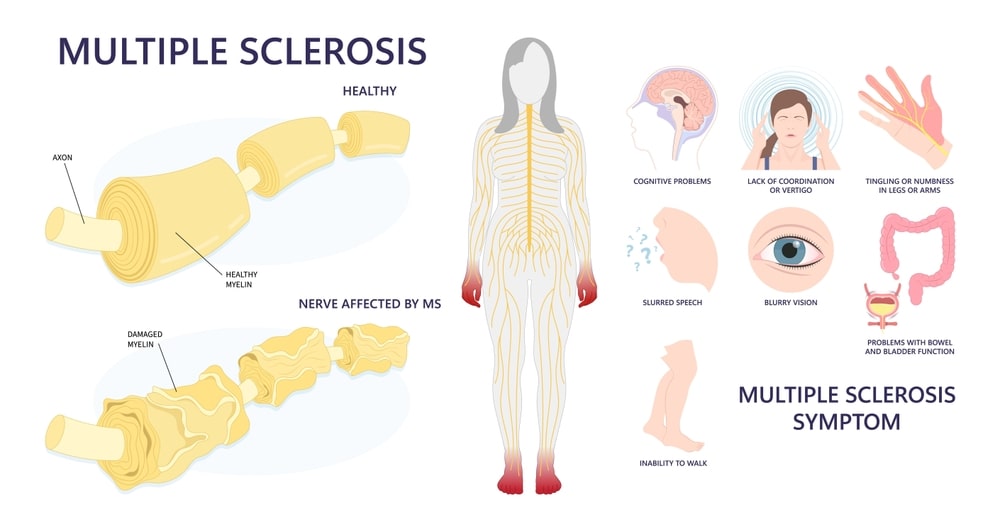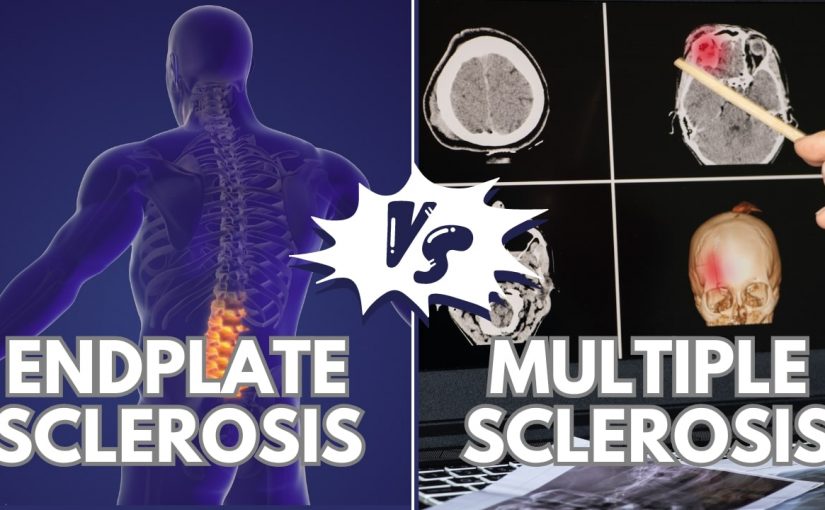Is Endplate Sclerosis The Same As Multiple Sclerosis
For any person having no idea about Multiple Sclerosis and Endplate Sclerosis, a common mistake would be spotting the “Sclerosis” term in both the names of the disorders and thinking of them as the same.
Have you got the same thoughts and the question “Is Endplate Sclerosis the same as Multiple Sclerosis” coming to your mind? Well, you need a proper clarification. You need to understand both neurological conditions for their accurate diagnosis and treatment.
Understanding Multiple Sclerosis and Endplate Sclerosis :
- Understanding Multiple Sclerosis and Endplate Sclerosis :
- Understanding Multiple Sclerosis and Endplate Sclerosis Causes :
- Multiple Sclerosis vs Endplate Sclerosis Symptoms :
- Multiple Sclerosis vs Endplate Sclerosis Diagnosis :
- Multiple Sclerosis vs Endplate Sclerosis Treatment :
- Medications for management of Multiple Sclerosis:
- Medications for the management of Endplate Sclerosis:
- Is Endplate Sclerosis the same as Multiple Sclerosis?
- FAQs:
Here is a simple definition of both the conditions:
- Multiple Sclerosis (MS) is a long-standing disorder of the central nervous system (brain and spinal cord), considered to be an autoimmune, neurological condition.
- Endplate Sclerosis (ES) is a disorder affecting the endplates of the spinal vertebrates causing symptoms that may be associated with spinal degenerative changes.
Now, that you have learned the meaning of the two disorders, you may be clear with our answer to your question, “Is Endplate Sclerosis the same as Multiple Sclerosis”. If not, let’s get into more details of both.
Multiple Sclerosis and Endplate Sclerosis vary in their causes, symptoms, diagnosis, and treatment. In further sections of this article, we will highlight the main differences.
Understanding Multiple Sclerosis and Endplate Sclerosis Causes :

The underlying cause of Multiple Sclerosis is an improper functioning of the immune system. It happens when the immune system cells mistakenly identify the healthy brain and nerve cells or tissues as foreign bodies and start attacking them.
To be more precise, the natural defense system of the body attacks the nerve’s protective coating called the myelin sheath, spanning the central nervous system. Wherever the myelin sheath gets damaged, lesions or scar tissues called sclerosis form leading to disruption of nerve impulses going to and from the brain and spinal cord. There is no clear reason for this, but genetics and environmental factors can be the culprits.

In contrast, Endplate Sclerosis is typically caused by normal aging processes and is commonly found in imaging studies of the spine of old people. It often allies with degenerative disc disease or intervertebral disc degeneration. A study reveals that excessive activation of TGF-beta by spinal instability can lead to vertebral endplate sclerosis.
Multiple Sclerosis vs Endplate Sclerosis Symptoms :
When looking at the key differences between multiple sclerosis and endplate sclerosis, signs and symptoms of both conditions need to be looked into and you need to be aware of their unique clinical manifestations.
Is Endplate Sclerosis the same as Multiple Sclerosis? Multiple Sclerosis presents a wide variety of neurological symptoms because of their effect on the brain and spinal cord. The primary symptoms include loss of vision, fatigue, and muscle spasticity.
Diverse symptoms present the progression of MS with initial signs ranging from numbness to mobility problems that further may develop into more evident neurological defects.
On the other hand, Endplate Sclerosis is localized to the spinal vertebrae’s endplates and so it yields symptoms linked to spine degeneration such as localized lower backache, stiffness, and discomfort.
Multiple Sclerosis vs Endplate Sclerosis Diagnosis :

Is Endplate Sclerosis the same as Multiple Sclerosis? For an effective treatment of multiple sclerosis and endplate sclerosis, it is crucial to have a good understanding of their symptoms, progression of the condition, and diagnostic imaging features.
To identify distinct diagnostic imaging features, there is a need for an early and accurate diagnosis using advanced imaging modalities along with a thorough review of the patient’s medical records and comprehensive conduct of physical exams for these disparate neurological conditions.
Early signs and diagnosis of Multiple Sclerosis may rely on the MRI scans of the brain and spinal cord showing the presence of lesions, specifically focusing on areas where there is myelin sheath damage. Besides MRI, neurological exam findings also help diagnose multiple sclerosis.
On the flip side, when MRI scanning is done on the spine of the patient with Endplate Sclerosis, the findings are characteristic of Modic changes (particularly Type 1). These findings indicate degeneration of the spinal vertebrae endplates and adjacent bone and inflammation in the affected area.
Multiple Sclerosis vs Endplate Sclerosis Treatment :

Multiple Sclerosis and Endplate Sclerosis pose different symptoms and unique challenges so different treatment approaches are needed to address them and empower patients to lead better quality of life.
For tackling Multiple Sclerosis, there are innovative disease-modifying therapies that are designed to reduce the progression of the condition and minimize the frequency of its relapse. The treatment options available for MS include medications to manage symptoms, physical therapies, and some lifestyle modifications. Pharmacological agents used include immunosuppressants, interferon-beta, and corticosteroids.
On the contrary, Endplate Sclerosis treatment often starts with targeted physical therapy and pain management. The treatment strategy is to make the patient do exercises that strengthen back muscles, improve the flexibility of the spine, and minimize the load on spinal structures.
Anti-inflammatory medications may be used judiciously to minimize discomfort associated with the condition. In severe cases, where conservative treatments like physical therapy and pain management fail to provide proper relief from symptoms, surgery is recommended for the spinal conditions.
Medications for management of Multiple Sclerosis:
- Natalizumab (Tysabri)
- Fingolimod (Gilenya)
- Dimethyl fumarate (Tecfidera)
- Alemtuzumab (Lemtrada)
- Siponimod (Mayzent)
Medications for the management of Endplate Sclerosis:
- Nonsteroidal Anti-Inflammatory Drugs (NSAIDs)
- Ibuprofen (Motrin)
- Naproxen (Aleve)
- Opioids (recommended for severe pain management)
- Cyclobenzaprine
Is Endplate Sclerosis the same as Multiple Sclerosis?
The short answer to this question is a NO. Although both Endplate Sclerosis and Multiple Sclerosis affect the nervous system, they are fundamentally different and can significantly impact one’s life quality.
Endplate Sclerosis condition causes the hardening of the vertebral endplates present in the spine. This is a type of degenerative disc disease. It leads to symptoms like spinal pain and stiffness due to vertebral endplate hardening.
Multiple Sclerosis is a type of autoimmune disorder and it affects the central nervous system. It causes symptoms like muscle weakness, vision problems, and coordination issues.
FAQs:
Is multiple sclerosis a movement disorder?
Movement disorder is a term used to refer to a set of neurological conditions that can cause abnormal voluntary or involuntary movements. Multiple sclerosis is known to have a close association with diverse movement disorders but it is not classified as a movement disorder. Rather, it is categorized as an autoimmune disorder, a chronic primary inflammatory demyelinating disorder of the brain and spinal cord- the central nervous system.
Can you donate plasma if you have multiple sclerosis?
If you are a multiple sclerosis patient wanting to save someone’s life by donating your blood plasma, at most blood donation centers you won’t be allowed to do so. As the definite cause of multiple sclerosis is not known, doctors may find blood plasma of multiple sclerosis patients is probably a trigger of the disease in the patient receiving it. But every blood donation center has its own set rules on who is allowed to donate blood plasma and so many centers may give permission. To confirm whether you can donate plasma, it’s better to call and ask at different centers.
Can dogs get multiple sclerosis?
Yes, pet dogs may develop multiple sclerosis disorder and show symptoms like behavioral changes, seizures, and difficulty in walking and balancing. Multiple sclerosis in dogs is confirmed and diagnosed with analysis of the dog’s spinal fluid and MRI scan.
Is endplate sclerosis serious?
Endplate sclerosis is the thickening or hardening of the vertebral endplates of the spine, especially affecting the elderly. It is not a serious concern and typically it does not own its cause symptoms or result in complications. However, the condition often accompanies degenerative disc disease and other spine conditions that cause symptoms. If these are left untreated, there is the possibility of nerve damage and a disability. In any case, it is important to monitor the symptoms and seek medical treatment.
Is endplate sclerosis a disability?
Is Endplate Sclerosis the same as Multiple Sclerosis and are both disabling? Many people think they are the same but they are not. Endplate sclerosis is not a disability on its own. However, its association with other spinal conditions or underlying causes could cause symptoms that could lead to disability. Often, Endplate sclerosis can contribute to disc degeneration which can be disabling because of the excruciating back pain it causes. In case symptoms are affecting daily functioning, it is important to consult a healthcare provider for an accurate diagnosis and guidance on effective management of symptoms and to receive appropriate treatment.

